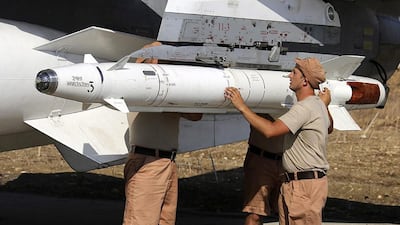The one certainty in an uncertain world is that Russia will continue to project its power in 2017 and will wittingly or unwittingly influence foreign policy calculations, events and even elections in disparate countries.
Is Russia to be feared then? Can it not be a force for good? After all, however fragile the December 29 Syrian ceasefire, and however contested and contestable the military tactics, political deal-making and bargaining chips used to change the situation on the ground, it is Russia that has moved decisively to try to end Syria’s six-year civil war. As Andrey Kortunov, head of a think tank close to the Russian foreign ministry, recently pointed out with some satisfaction, a wider peace deal is not expected easily or soon, but Vladimir Putin’s Russia has staked its claim to a lead role in the process.
And there are signs that Russia may also be considering some sort of intervention in the chaos that is Libya. General Khalifa Haftar, military commander of the Tobruk-based parliament, is understood to have visited Moscow twice last year with a request for military support. This is off-limits under a 2011 United Nations embargo that prohibits arms supplies to any entity other than the UN-backed government of Fayez Al Seraj. However, the septuagenarian general has recently enjoyed some military advances and may have ambitions to emerge as a transformational and unifying national leader. A Russian thumb on the scale could be decisive for Libya, ending its years of leaderless descent into lawlessness and the propensity to be controlled by one or more extremist groups.
By rights, the wider world should be cheering the apparent willingness of Mr Putin’s Russia to tread where the West dare not. Both Libya and Syria are regarded as intractable conflicts. The West has seemed paralysed by a lack of creative imagination and muscular determination. Moscow stepped into the void, and yet it remains difficult to see Russia as a great power worthy of genuine admiration and entitled to grateful applause.
Instead, it is derided as a wannabe player, a disruptive force that is determined to return the world order to a dangerously adversarial contest on fronts ranging from cyber space to outer space and geopolitical space. After the Syrian ceasefire was announced at the tail end of last year, one US official dismissed Russia as follows: “This country that essentially has an economy the size of Spain … strutting around and acting like they know what they are doing.”
That unnamed American was not wrong on points, just on the propriety of holding a prickly and nuclear-armed rival up to ridicule. Russia is poorer now than before its adventurism in Crimea. Its GDP has halved to less than that of Italy, and barely a quarter of its people have any savings (down from 72 per cent in 2013).
By all accounts, Mr Putin would prefer to be feared rather than derided. In his new book Should we fear Russia, Dmitri Trenin, the long-time director of the Carnegie Moscow Center, explains the motivation for Moscow's risk-taking in different theatres, starting with the annexation of Crimea. In the decades since the Cold War, says Trenin, Moscow felt it wasn't treated with the respect due a nuclear power. So, Mr Putin reached into his inner pocket and pulled out a "nuclear" gun, placing it on the table for all to see. Fear is all he had, emphasises Trenin, because of the huge asymmetry with the United States.
Trenin’s characterisation is particularly insightful because he served in both the Soviet and Russian militaries. It also helps explain the logic of the Kremlin’s manifest dilemma over the upcoming centenary this year of the momentous revolution that changed Russia and affected the world. It was in 1917 that tsarism was forced to an end and the 70-year communist experiment forcibly begun. But Mr Putin, who believes that resolute stability helps protect Russia from a hostile world, is loath to mark either. To celebrate Lenin’s revolution would signify support for a political uprising. To evoke Tsar Nicholas II would identify 21st-century Russia with a weak leader.
Accordingly, the Russian president grimly reminded his people last month of “the consequences that these great upheavals can bring” and urged them to “remember that we are a single people, a united people, and we have only one Russia”.
The obsession with unity and strength is apparent in the different strands Mr Putin has woven together to create the sturdy swaddling clothes in which to lay the fledgling idea of Russia’s destiny as a great power. On his watch, the search for symbols of national identity and strength have included some controversial choices.
In October, the country got its first monument to Tsar Ivan IV, known to much of the world as Ivan the Terrible, on the grounds that he expanded 16th-century Russia’s frontiers and defended Russian Orthodox Christianity. In November, another monument, this time of a 10th-century prince who adopted the faith, was erected outside the Kremlin.
All of this is alarming to people who know Russia. They see these developments in the context of distinguished British historian Arnold Toynbee’s 70-year-old theory about Europe being home to two separate "civilisations" – the western and the Russian Orthodox. Mr Putin’s Russia, they say, wants to claim its share of its European civilisational heritage, starting with part of Ukraine.
Perhaps there is a reason to fear Russia.
Rashmee Roshan Lall is a writer on world affairs
On Twitter: @rashmeerl


